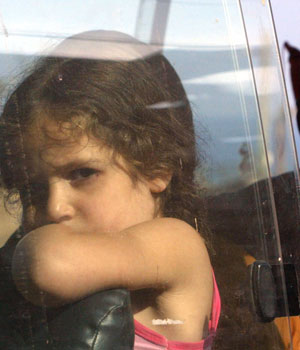
A girl sits in a car with her family as they flee the Israeli attacks on south Lebanon in Damour July 15, 2006 (REUTERS)
BEIRUT, (Reuters) – Residents on both sides of the Lebanese-Israeli border braced on Saturday for a dramatic spike in violence after Hezbollah’s chief declared open war on Israel following its bombardment of his Beirut home and stronghold.
“You wanted open war. We are going to open war,” Sayyed Hassan Nasrallah said in a call to Hezbollah’s television.
“Look at it burn”, he urged listeners, announcing an attack which set ablaze an Israeli warship that had earlier hit Beirut.
Israel confirmed four of its sailors were missing after the strike, part of the bloodiest bout of violence in Lebanon in a decade, started by an attack on Wednesday in which Hezbollah guerrillas captured two Israeli soldiers and killed eight.
The Israeli army was still searching for its missing as dawn approached. It said a civilian boat, possibly from Egypt, was also hit by a missile in the same attack that damaged its ship.
The violence in Lebanon coincided with an Israeli attack on the Gaza Strip launched last month to try to retrieve another captured soldier and halt Palestinian rocket fire.
Celebratory gunfire erupted in Beirut following Nasrallah’s speech, which raised morale among his supporters after Israel imposed an air, sea and land blockade on the country and launched air strikes on roads, bridges and airports that have killed a total of 67 people, almost all civilians.
The Iranian- and Syrian-backed group, which wants to trade its captives for Lebanese prisoners held in Israel, fired more rockets across the frontier on Friday, killing two Israelis.
Israeli air strikes destroyed Nasrallah’s apartment building and a main Hezbollah office in southern Beirut but an Israeli army spokeswoman would not say if the intention had been to kill the group’s charismatic leader.
The bitterness of the confrontation has raised fears it could spread, but Hezbollah did not immediately follow up Nasrallah’s threat with any more attacks.
And unlike Israel’s pre-dawn bombardment of the Lebanese capital the previous night, air strikes were confined to south Lebanon on Saturday, killing one civilian and wounding six in an attack targeting a gas station in the city of Sidon, medics and witnesses said.
Ten people were also wounded in another raid on a village located 15 km (nine miles) to the south of the city of Tyre, security sources said.
Syria’s ruling Baath Party said it would support Hezbollah and Lebanon against Israel’s attacks. The pledge came despite the sometimes hostile ties that have prevailed between the neighbours since Damascus ended its 29-year military presence in Lebanon last year under local and international pressure.
“The Syrian people are ready to extend full support to the Lebanese people and their heroic resistance to remain steadfast and confront the barbaric Israeli aggression and its crimes,” the ruling party said in a statement.
Israel’s aerial assault has drawn mounting international criticism but the White House said U.S. President George W. Bush would not press Israel to halt its military operation.
Asked whether Bush had agreed to a request from Lebanese Prime Minister Fouad Siniora that he rein in the Israelis, White House spokesman Tony Snow said: “No. The president is not going to make military decisions for Israel.”
He told reporters that Bush had spoken by telephone to Siniora and other Middle East leaders and that the U.S. president believed Israel had the right to protect itself, but should avoid civilian casualties and damage.
The violence is the fiercest since 1996 when Israel launched a 17-day blitz on Hezbollah strongholds in the south, four years before its troops ended their 22-year occupation of the area.
Israeli aircraft rocketed runways at Beirut’s already closed international airport and bombed a flyover just to the south.
Israeli warplanes blasted the main Beirut-Damascus highway overnight on Thursday, tightening its blockade and bombing targets in Beirut’s teeming Shi’ite Muslim suburbs.
Hezbollah rocket attacks on northern Israel have now killed four Israelis and wounded more than 150, causing panic.
Israeli Prime Minister Ehud Olmert’s office said such salvos “cannot and will not be allowed to continue”.
Israel holds Lebanon responsible for the actions of Hezbollah, a political-military faction which has members in parliament and in the mainly anti-Syrian cabinet.
The fragile Beirut government, too divided to disarm Hezbollah or extend its own control to the border, urged the U.N. Security Council to tell Israel to halt its onslaught.
It asked the Council to impose a ceasefire, but Israel said it was trying to free its neighbour from terrorist occupation and insisted the Beirut government secretly backed its actions.
Strong criticism of Israel came from France and the Vatican, as well as Egypt, Jordan and other countries.
In Gaza on Friday, Israel bombed offices of Hamas lawmakers, destroyed a bridge and fired a tank shell that killed a Palestinian.
Palestinian gunmen blew a hole in the border wall between Gaza and Egypt, allowing hundreds of Gazans who had been stranded on the closed border for two weeks to enter the Strip.
Since the Gaza offensive was launched on June 28, Israel has killed more than 80 Palestinians, a majority of them militants.

Smoke rises and debris flies from a bridge as it is targeted by an Israeli air raid, in the Zahrani region, on the Mediterranean coast, southern Lebanon, July 14, 2006 (AP)

File picture dated 25 May 2005 shows the head of Lebanon’s Shiite Muslim movement Hezbollah Sheikh Hassan Nasrallah addressing supporters in Bint-Jbeil, a Shiite town near the Israeli border (AFP)
